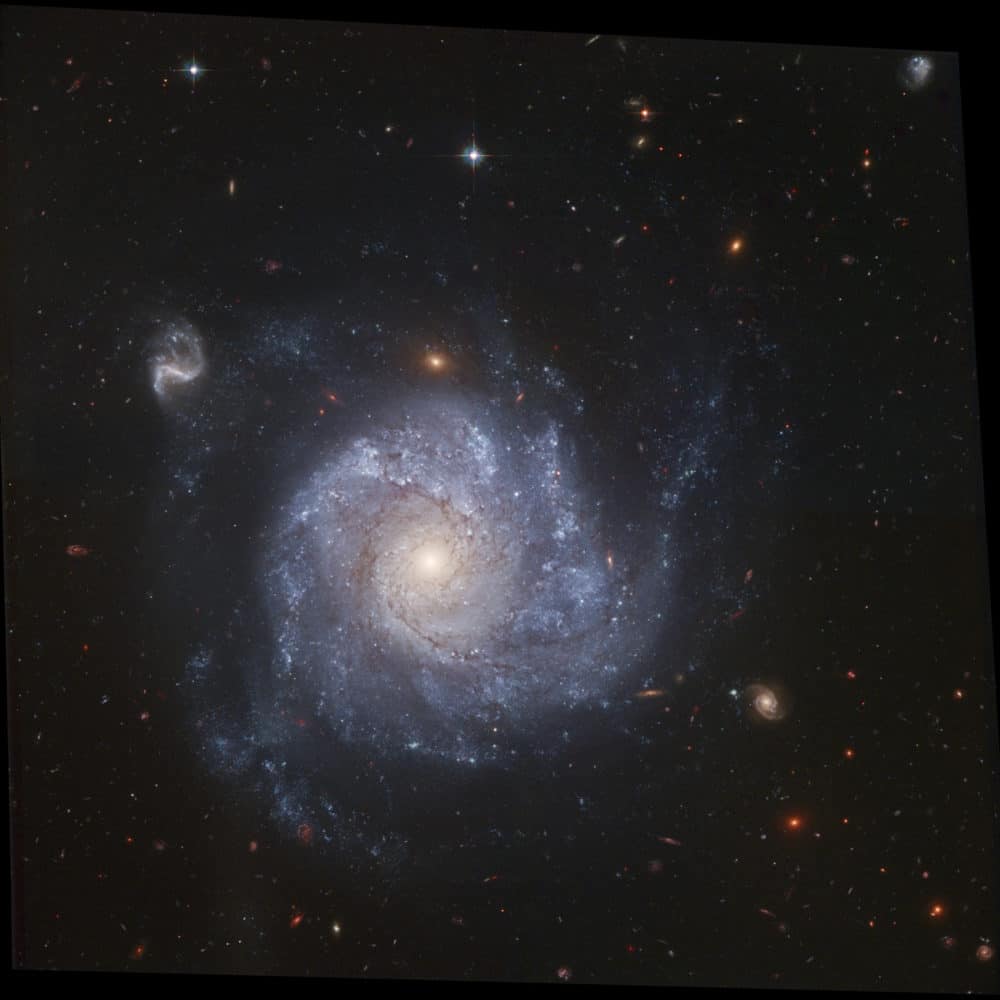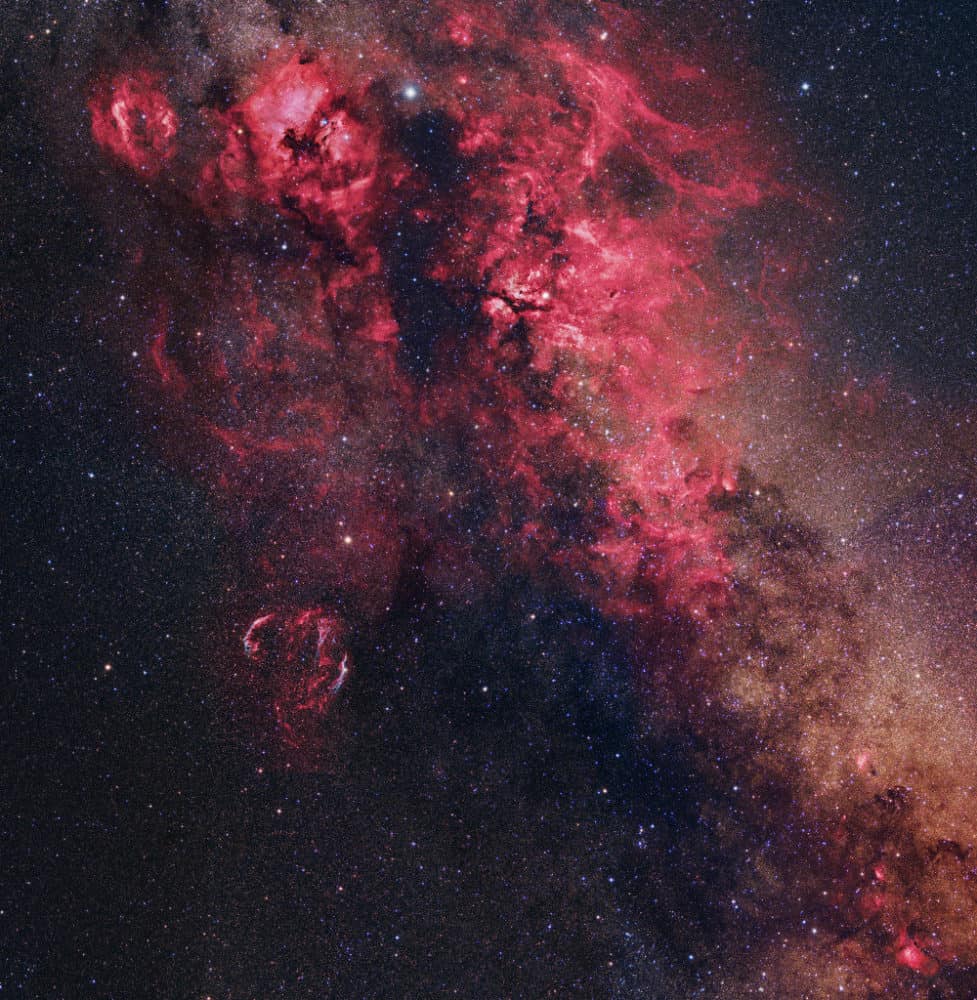Blog
https://www.youtube.com/watch?v=7Ot_xyUU2lA
more...The Merope Nebula (also known as Tempel’s Nebula and NGC 1435) is a diffuse reflection nebula in the Pleiades star cluster, surrounding the 4th magnitude star Merope. It was discovered on October 19, 1859 by the German astronomer Wilhelm Tempel. John Herschel, in his New General Catalogue(NGC), described it as a very faint nebula about the size of the full moon.
The Merope Nebula has an apparent magnitude starting at 13 and quickly dimming by a factor of about 15, making most of the nebula dimmer than magnitude 16. It is illuminated entirely by the star Merope, which is embedded in the nebula. It contains a bright knot, IC 349, about half an arcminute wide near Merope. It appears blue in photographs because of the fine carbon dust spread throughout the cloud. Though it was once thought the Pleiades formed from this and surrounding nebulae, it is now known that the Pleiades nebulosity is caused by a chance encounter with the cloud.
A small and unique nebula which is close to Merope was discovered by Edward Emerson Barnard in November 1890. It is naturally very bright but is almost hidden in the radiance of Merope. Distance 440 ly.
more...Edward Simon (born July 27, 1969) is a Venezuelan jazz pianist and composer.
Simon was born in Punta Cardón, Venezuela. When he was ten years old, he went to the United States of America to study at the Performing Arts School in Philadelphia. After graduating, he attended the University of the Arts in Philadelphia, where he studied classical piano, then the Manhattan School of Music, where he studied jazz piano.
In 1988, he recorded as a sideman with Greg Osby, then worked as a member of the band Horizon led by Bobby Watson. For the next eight years he was a member of Terence Blanchard‘s band. He has also worked with Herbie Mann, Paquito D’Rivera, Bobby Hutcherson, Jerry Gonzalez, John Patitucci, Arturo Sandoval, Manny Oquendo, and Don Byron. Simon recorded Beauty Within (AudioQuest, 1994), his first album as a bandleader, with Horacio Hernández and bass guitarist Anthony Jackson. During the same year, he was a finalist in the Thelonious Monk International Jazz Piano Competition. Then the following year he composed Rumba Neurotica for the Relache Ensemble.
more...
Jean Toussaint (born July 27, 1960) is an American jazz tenor and soprano saxophonist.
Toussaint was born in Saint Thomas, U.S. Virgin Islands, and was raised in Saint Thomas and New York City. He learned to play calypso as a child and attended Berklee College of Music in the late 1970s, studying under Bill Pierce (saxophonist). In 1979 he formed a group with Wallace Roney and from 1982 to 1986 was a member of Art Blakey and the Jazz Messengers alongside Terence Blanchard, Donald Harrison, Mulgrew Miller and Lonnie Plaxico. With Blakey he recorded three studio albums, including New York Scene, which won a Grammy for Best Jazz Instrumental Performance.
In 1987, Toussaint moved to London when was he invited to be artist-in-residence at the Guildhall School of Music by Lionel Grigson, at the time the school’s professor of jazz. In the late 1980s Toussaint had a regular slot at the fabled Dingwalls club in Camden Town on Sunday afternoons. Since then, Toussaint has maintained a profile as a band leader in the UK and Europe, playing with British musicians including, among others, Steve Williamson, Courtney Pine, Julian Joseph, Jason Rebello, Cleveland Watkiss. He has also performed in groups led by McCoy Tyner, Gil Evans, Kirk Lightsey, Cedar Walton, Max Roach, Horace Silver and Jeff Tain Watts. In addition he has collaborated with Lionel Loueke.
Toussaint has released ten albums as a leader, his most recent entitled Tate Song in February 2014 with LYTE Records.
In 2015/16 Toussaint devised a project dedicated to his mentor Blakey. The project was entitled ‘Roots & Herbs: The Blakey Project’ and featured an All-Star Lineup of British Jazz Musicians, including Julian Joseph, Byron Wallen, Dennis Rollins, Jason Rebello and Shane Forbes. The group toured the UK extensively throughout 2015 / 2016.
more...Moses Rascoe (born July 27, 1917 in Windsor, NC, died March 6, 1994 in Lebanon, PA) got his first guitar in North Carolina at the age of 13 and turned professional in Pennsylvania some 50-odd years later. In between, he traveled the roads as a day laborer and truck driver, playing guitar only for “a dollar or a drink,” as he told Jack Roberts in Living Blues. But he’d picked up plenty of songs over the years, from old Brownie McGhee Piedmont blues to Jimmy Reed‘s ’50s jukebox hits, and when he retired from trucking at the age of 65, he gave his music a shot. The local folk-music community took notice, as did blues and folk festivals from Chicago to Europe. Rascoerecorded his first album live at Godfrey Daniels, a Pennsylvania coffeehouse, in 1987.
more...NGC 1309 is a spiral galaxy located approximately 120 million light-years away, appearing in the constellation Eridanus. It is about 75,000 light-years across, and is about 3/4s the width of the Milky Way. Its shape is classified as SA(s)bc, meaning that it has moderately wound spiral arms and no ring. Bright blue areas of star formation can be seen in the spiral arms, while the yellowish central nucleus contains older-population stars. NGC 1309 is one of over 200 members of the Eridanus Group of galaxies.
more...Jonathan “Juanito” Pascual (born July 26, 1973) is an American-born flamenco guitarist and composer.
In 2011 Pascual formed the Juanito Pascual New Flamenco Trio with percussionist Tupac Mantilla, and bassist Brad Barrett (Haggai Cohen Milo, in the first iteration). The Trio’s self-titled release came out in Feb. 2014, creating a sound that merges flamenco with elements of jazz, rock and world-music influences.
He has collaborated with numerous environmental projects, and has an ongoing relationship with Earth Train and their Junglewood project in the Panamanian rain forest. In fall of 2013 he was invited to perform at Panama’s Biodiversity Museum in association with National Geographic to celebrate Earth Train’s collaboration with Jane Goodall.
A graduate with honors from Boston’s New England Conservatory of Music from their Contemporary Improvisation program in 1997.
more...Joanne Brackeen (born Joanne Grogan; July 26, 1938) is an American jazz pianist and music educator. Joanne Grogan was born in Ventura, California and attended the Los Angeles Conservatory of Music. She was a fan of pop pianist Frankie Carle before she became enamored with the music of Charlie Parker. In the 1950s she performed with Dexter Gordon, Teddy Edwards, and Charles Brackeen. She and Brackeen married and moved to New York City in 1965. She performed with Chick Corea, Freddie McCoy, and Ornette Coleman.
She played with Joe Henderson (1972–75) and Stan Getz (1975–77) before leading her own trio and quartet. Brackeen established herself as a cutting edge pianist and composer through her appearances around the world, and her solo performances also cemented her reputation as one of the most innovative and dynamic of pianists. Her trios featured such noted players as Clint Houston, Eddie Gómez, John Patitucci, Jack DeJohnette, Cecil McBee, and Billy Hart.
She served on the grant panel for the National Endowment for the Arts, toured the Middle East with the US State Department as sponsor, and had solo performances at Carnegie Hall.
She has recorded over twenty albums as a lead musician and is a professor at the Berklee College of Music and at The New School.
more...Erskine Ramsay Hawkins (July 26, 1914 – November 11, 1993) was an American trumpeter and big band leader from Birmingham, Alabama, dubbed “The 20th Century Gabriel”. He is most remembered for composing the jazz standard “Tuxedo Junction” (1939) with saxophonist and arranger Bill Johnson. The song became a popular hit during World War II, rising to No. 7 nationally (version by the Erskine Hawkins Orchestra) and to No. 1 nationally (version by the Glenn Miller Orchestra). Vocalists who were featured with Erskine’s orchestra include Ida James, Delores Brown, and Della Reese. Hawkins was named after Alabama industrialist Erskine Ramsay.
Erskine Hawkins was named by his parents after Alabama industrialist Erskine Ramsay who was rewarding parents with savings accounts for them for doing so. Hawkins attended Councill Elementary School and Industrial High School (now known as Parker High School) in Birmingham, Alabama. At Industrial High School, he played in the band directed by Fess Whatley, a teacher who trained numerous African-American musicians, many of whom populated the bands of famed band leaders such as Duke Ellington, Lucky Millinder, Louis Armstrong and Skitch Henderson (of the NBC Orchestra.)
more...
Flamenco Fridays with Zambra.
Zambra (Spanish pronunciation: [ˈθambɾa]), (from Andalusi Arabic Zamra, originally from classical Arabic Zamr) is a style of Flamenco dance, typical of the Gypsies of the provinces of Granada and Almeria (Andalusia, Spain).
It is believed that the Zambra is a continuation of earlier Morisco styles of dance. It became typical during wedding ceremonies, although nowadays it is particularly commonly danced for tourists in the caves of Sacromonte (Granada) and in the caves of Almería. In modern times, it has been espoused by flamenco dancers Carmen Amaya, Lola Flores, and Puela Lunaris. It is danced barefoot with finger cymbals; the blouse is tied under the bust and the skirt is very tight around the hips, then flares out and has a ruffle at the end.
more...
The plane of our Milky Way Galaxy near the northern end of the Great Rift and the constellation Cygnus the Swan. Composed with three different telescopes and about 90 hours of image data the widefield mosaic spans an impressive 24 degrees across the sky. Alpha star of Cygnus, bright, hot, supergiant Deneb lies near top center. Crowded with stars and luminous gas clouds Cygnus is also home to the dark, obscuring Northern Coal Sack Nebula, extending from Deneb toward the center of the view. The reddish glow of star forming regions NGC 7000, the North America Nebula and IC 5070, the Pelican Nebula, are just left of Deneb. The Veil Nebula is a standout below and left of center. A supernova remnant, the Veil is some 1,400 light years away, but many other nebulae and star clusters are identifiable throughout the cosmic scene. Of course, Deneb itself is also known to northern hemisphere skygazers for its place in two asterisms — marking the top of the Northern Cross and a vertex of the Summer Triangle.
Deneb /ˈdɛnɛb/ is a first-magnitude star in the constellation of Cygnus, the swan. Deneb is one of the vertices of the asterism known as the Summer Triangle and the “head” of the Northern Cross. It is the brightest star in Cygnus and the 19th brightest star in the night sky, with an average apparent magnitude of 1.25. A blue-white supergiant, Deneb rivals Rigel as the most luminous first magnitude star. However its distance, and hence luminosity, is poorly known; its luminosity is somewhere between 55,000 and 196,000 times that of the Sun. Its Bayer designation is α Cygni which is Latinised to Alpha Cygni, abbreviated to Alpha Cyg or α Cyg.
Deneb’s adopted distance from the Earth is around 802 parsecs (2,620 ly)
more...Donald Johnson Ellis (July 25, 1934 – December 17, 1978) was an American jazz trumpeter, drummer, composer, and bandleader. He is best known for his extensive musical experimentation, particularly in the area of time signatures. Later in his life he worked as a film composer, contributing a score to 1971’s The French Connection and 1973’s The Seven-Ups. Ellis was born in Los Angeles, California, on July 25, 1934. His father was a Methodist minister and his mother a church organist. He attended West High School in Minneapolis, MN. After attending a Tommy Dorsey Big Band concert, he first became interested in jazz. Other early inspirations were Louis Armstrong and Dizzy Gillespie. He graduated from Boston University in 1956 with a music composition degree.
Cornelius “Johnny” Hodges (July 25, 1907 – May 11, 1970) was an American alto saxophonist, best known for solo work with Duke Ellington‘s big band. He played lead alto in the saxophone section for many years. Hodges was also featured on soprano saxophone, but refused to play soprano after 1946. He is considered one of the definitive alto saxophone players of the big band era (along with Benny Carter).
After beginning his career as a teenager in Boston, Hodges began to travel to New York and played with Lloyd Scott, Sidney Bechet, Luckey Robertsand Chick Webb. When Ellington wanted to expand his band in 1928, Ellington’s clarinet player Barney Bigard recommended Hodges. His playing became one of the identifying voices of the Ellington orchestra. From 1951 to 1955, Hodges left the Duke to lead his own band, but returned shortly before Ellington’s triumphant return to prominence – the orchestra’s performance at the 1956 Newport Jazz Festival.
Hodges was born in the Cambridgeport neighborhood of Cambridge, Massachusetts, to John H. Hodges and Katie Swan Hodges, both originally from Virginia. After moving for a short period of time to North Cambridge, the family moved to Hammond Street in the South End of Boston, where he grew up with baritone saxophonist Harry Carney, and saxophonists Charlie Holmes and Howard E. Johnson.
https://www.youtube.com/watch?v=15pTu_OzAG4
more...Semmangudi Radhakrishna Srinivasa Iyer (25 July 1908 – 31 October 2003) was a Carnatic vocalist. He was the youngest recipient of the Sangeetha Kalanidhi awarded by the Music Academy in 1947 and has received many awards including Padma Bhushan and Padma Vibhushanfrom the Government of India, Sangeet Natak Academy award (1953), Isai Perarignar from Government of Tamil Nadu and Kalidas Samman from Government of Madhya Pradesh. He was affectionately addressed as “Semmangudi Maama” (Semmangudi Uncle) by his disciples. He, along with his contemporaries G.N. Balasubramaniam and Madurai Mani Iyer, are referred to as the 20th century male trinity of Carnatic music. He was also considered the “Pitamaha” or the grand sire of modern Carnatic Music. He was conferred with an honorary doctorate by University of Kerala in 1979.
He was born in Tirukkodikaval, Tanjore district as the third son of Radhakrishna Iyer and Dharmasamvardhini Ammal. He lived with his maternal uncle Tirukkodikaval Krishna Iyer, a violin maestro, until the age of four and after his death, moved back to his parents’ home in Semmangudi, Tiruvarur District. At the age of eight he started learning music from his cousin Semmangudi Narayanaswamy Iyer. This was followed by some rigorous training under Thiruvadaimaruthur Sakharama Rao, a famous Gottuvadhyam exponent, an event considered by Semmangudi as a turning point in his life. This was followed by another training stint with Narayanaswamy Iyer, during which time he learnt a lot of varnams and keerthanams. Then he had a musical apprenticeship with Maharajapuram Viswanatha Iyer. In 1926, he performed his first music recital at Kumbakonam.[6] In 1927 gave a concert in the Madras session of Indian National Congress, another event considered by Semmangudy as a turning point in his life, as it catapulted him into the big league of vidwans at that time. He was known for producing soulful music, highly creative and yet very orthodox, despite a recalcitrant voice.
more...More Posts
- Lalgudi Gopala Jayaraman
- Cosmos NGC 1559
- Hank Williams
- Jack McDuff
- José Mauro Memorial
- Daily Roots Prince Far I
- Cosmos IC 2948
- M. S. Subbulakshmi
- Joe Venuti
- Hildegard of Bingen
- Charlie Byrd
- B. B. King
- World Music África Negra
- Daily Roots The Prophets
- Cosmos Abell 70
- Signe Toly Anderson
- Arvell Shaw
- Cannonball Adderley
- World Fusion The Silkroad Ensemble
- Daily Roots Ras Karbi


